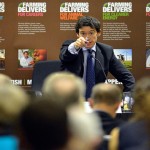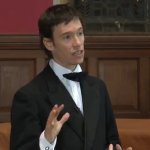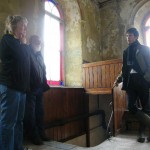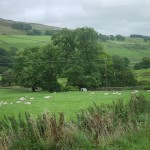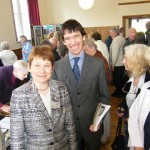parliament speaks
I have been in parliament for over a year but I am only just beginning to understand how it works. It speaks: all the time. It is a last fragment of preliterate England: a place where what matters is not what is written, still less what is e-mailed, but what is spoken. Speaking is the currency of the house. But who is listening? According to a web-site, I have made 85 “appearances” in parliament in the last year, and spoken on average in one debate a week when parliament is sitting. I have spoken in topical and oral questions; in Prime-minister’s questions and urgent statements; finance bills, adjournment, opposition, and Westminster Hall debates; delegated legislation, and European committees; and spent more than a hundred hours on a select committee.
Sometimes, I’m struggling to take nineteen interventions in a fifteen minute speech, beneath the wood panels of “Westminster Hall’; sometimes I am cross-questioning a Minister in a room with pop-art tapestry on the wall. Sometimes I am asking the Prime-minister a question at midday on live TV and the chamber packed to standing; sometimes it is eleven at night and there are only the six Cumbrian MPs present. I have spoken on single farm payments and flooding; on localism and Libya; pubs and Afghanistan; the budget and Brazil; on funding for charities and for special educational needs; on the Olympics and shootings and broadband. I have learnt whether to call the person at the end of the room Mr.Speaker, Chairman or Ms.Primarolo; and that, when the mace is under the table, I should speak only to “the amendment”. A website has concluded that I have used three-word alliterative phrases (“she sells sea-shells”) 26 times. Even my mother is beginning to get tired of watching me on BBC Parliament but many of my colleagues speak much more. What, however, is the point of this all talking?
Last week, I introduced my own debate on mobile phone coverage on the floor of the house. At present, at any one time, over seven million people cannot connect to a mobile signal. The problem is at its worst in rural areas. Good mobile and broadband coverage will help the small companies, which employ 92 per cent of the people in this constituency. Mobile signals can allow us to use devices to monitor our health, minute by minute around our home, instead of being trapped in hospitals. On-line learning can transform children’s performance in education. For Cumbria, mobile broadband will improve economic growth and our over-stretched services; and help us live and flourish in remote areas. But OFCOM, the mobile regulator, has no plans to extend the coverage. Why? Because they fear that if the mobile companies were obliged to increase their coverage, the government would get 5 or 8 per cent less from selling the mobile license. For the sake of this, they propose to leave millions of people and thousands of square miles of Britain without coverage, probably for the next generation.
At first, I tried to simply convince OFCOM to change its mind through private meetings. I called a dozen experts, catching them in China, or from the Eurostar, and talked to them till my mobile burned against my ear. I poured over technical papers on how to split, stretch and retransmit the spectrum. I met with civil servants, with junior and senior officials at OFCOM, with ministers and with telecoms companies. At first everything seemed fine. But then voices began to say, quietly, “You are not going to make any friends if you keep pushing.’
I couldn’t believe it. In return for making slightly less in the auction, we could have a mobile broadband infrastructure, which would bring great social and economic benefit. Surely, it was a no-brainer. But I was soon hearing a dozen arguments against: that the spectrum was “unsuitable for voice”; that an increased obligation would cripple the companies and “undermine urban coverage”; that it could be easily done in three years time instead. Every argument was untrue. But it was clear that I was getting nowhere.
So, I pushed for a full debate in the House of Commons. I spent days bringing it together, writing individually to a hundred and fifty MPs, convincing the House of Commons to create time, negotiating with the department and the whips and organising speakers. Last Thursday, I opened and closed the debate. 110 MPs from all parties signed: more than on any motion, debated on the floor of the house, in living memory; thirty of these MPs spoke. And we passed the motion to urge OFCOM ‘to increase the coverage above 98 per cent of the population’ with a unanimous vote.
Here, it seemed was a real concrete use of parliament. But yesterday, a colleague said nothing would happen for fifteen years. The head of OFCOM is angry with me; officials are referring mysteriously to complications with ‘coverage definition’, and ‘the distortion of market diversity’. And the whole thing seems to be slipping out of my hands again. I am back to writing letters and e-mails and lobbying and pleading with officials and ministers. I think I’ll win this fight, eventually, but parliament has spoken. Who, really, is listening?





